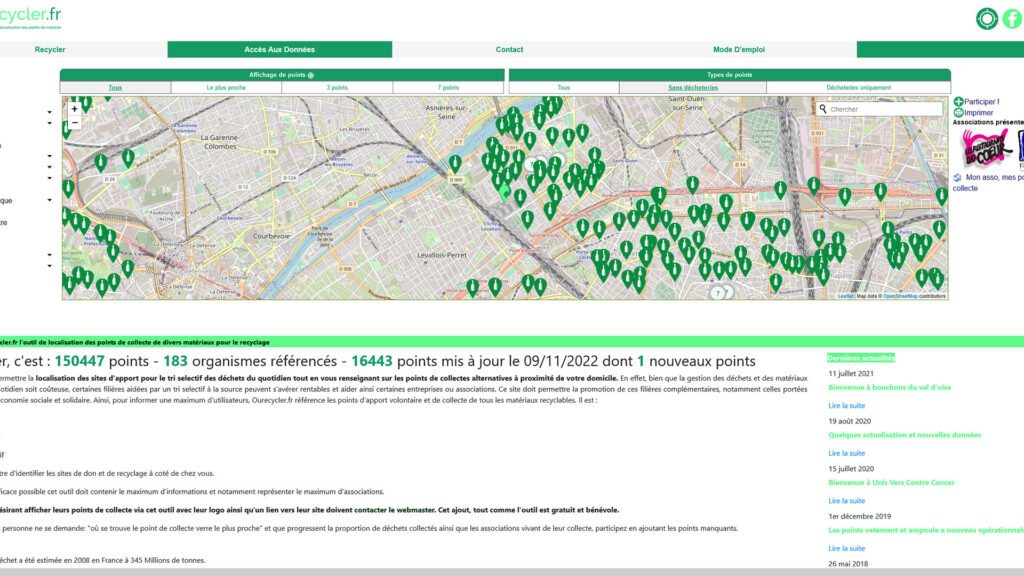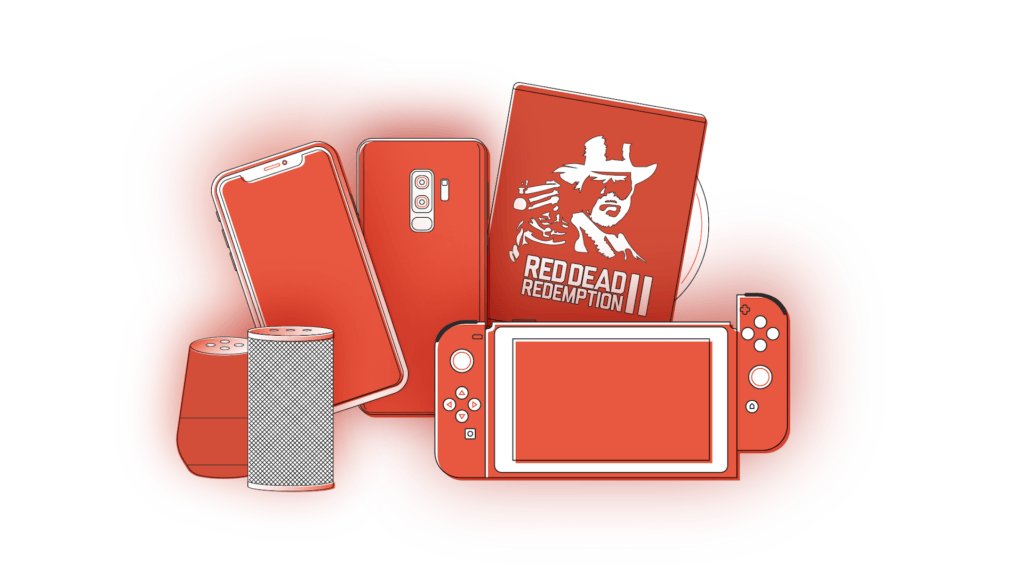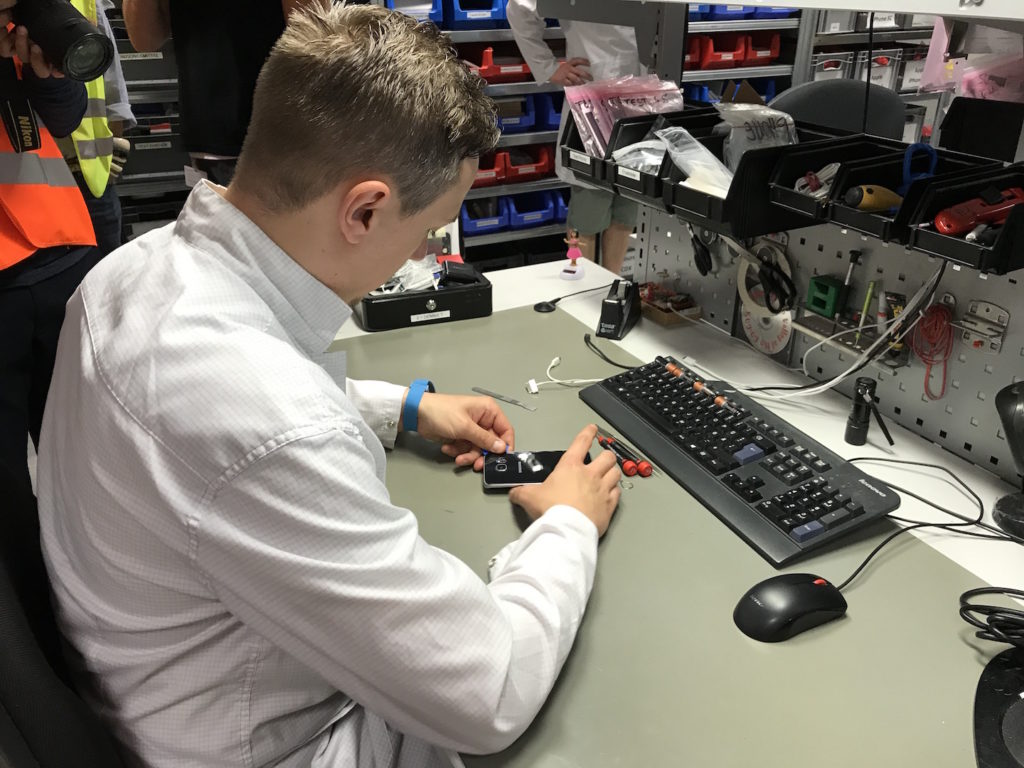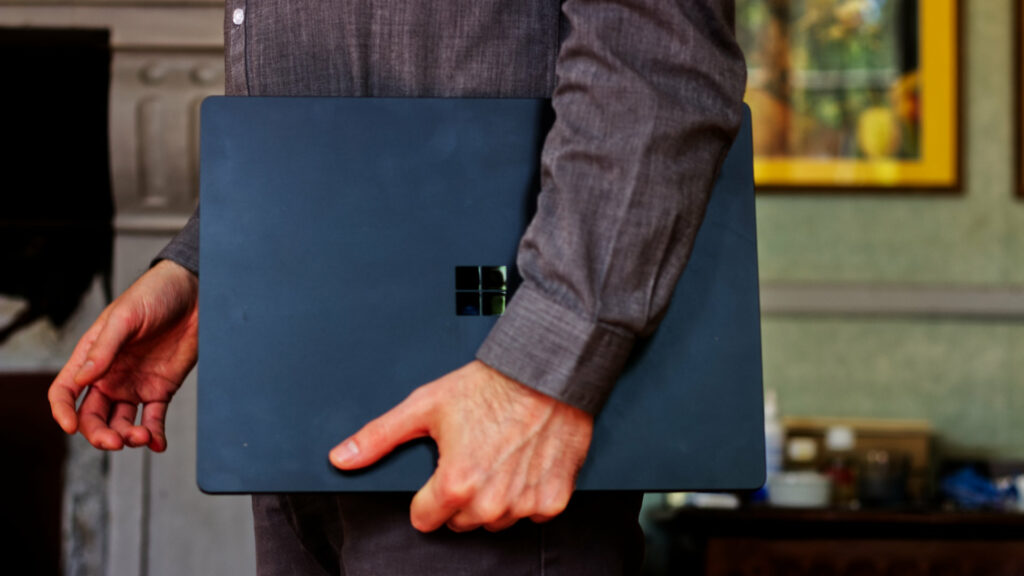To get rid of your old electronic objects, there are several solutions. You can recycle them or give them away, make a little money with them, or even abandon them in a shop, for a new object.
We all have an old smartphone or an out of order video game console lying around in our closets. Sometimes it’s by “ laziness to get rid of it. But most of the time, it’s mostly that people don’t know what to do with it. There are three possibilities for disposing of obsolete or broken down equipment: recycle, resell, or go to the store to have your product taken back. We explain all this to you.
In any case, remember to erase all data from the smartphone.
Option 1: recycle and reuse electronic devices
Avoid the classic trash can for high tech
The first option is to throw away your used or broken products. Be careful not to get rid of it just anywhere. It is forbidden to throw your devices in the nature and the classic trash cans are not suitable either. What is thrown in a yellow bin, for example, is metal packaging and waste, paper, aluminum, plastic waste…
If it is necessary to avoid throwing this type of waste, even small, in nature or in conventional trash cans, it is because they sometimes contain toxic and dangerous products. Moreover, this does not recover valuable resources contained in electronic devices, which could be reused to manufacture others – manufacturers are aware of this.
Waste and bulky items to dispose of electronics
The first option for recycling is the landfill. They exist everywhere in France. Small electronic objects such as batteries or batteries can be placed there, as well as larger electrical and electronic devices (fridge, television, washing machine, etc.). You can bring a broken computer, for example, or a broken printer.
To find the nearest recycling center to your home, you contact your town hall, which will direct you. Access information and opening hours are also available on the municipality’s website.
Another solution is to use municipal bulky waste. Again, the service varies depending on your location. In Paris, a site allows you to enter the type of object, the day and the time you wish to have it removed. There are also some sorts of mobile recycling centers in the capital. This solution is convenient, but it is not optimal. Many products are vandalized or stolen in the street before being recovered by dedicated services.
Throw away batteries, bulbs, cartridges, neon lights…
Bulbs should not be thrown in the trash. They may contain dangerous products. Since 2005, it has been mandatory to indicate this on the packaging of the ampoule – a pictogram showing a crossed-out dustbin. In general, this applies to energy-saving light bulbs, fluorescent tubes and LED lamps. The Ecosystem organization tells you where to get rid of it for recycling.

As for light bulbs, neon lights, batteries, accumulators, batteries, ink cartridges, the dedicated Corepil site lists the collection points. Note that for smaller waste, free access collection points are very common now in shopping centers or supermarkets. Drop them off before shopping.
Recycling centres, resource centers and associations
If your equipment is still in working order or possibly repairable, you have the option of recycling centers and recycling centers. These places allow this waste (those and others) to be collected, valued and resold without profit. It may be wise to make a phone call beforehand to check if such and such an object can be recovered by this channel.
You can find a list of resource centers on the resourcerie.fr website. The OpenDataSoft site lists the recycling centers in Île-de-France.
As for the associations, a collection also exists. Emmaus recovers them in working order or not, resells them and uses the money collected to help people in precarious situations. To find the donation centers near you, go to the association’s website.
More local associations can also collect depreciated, but functional equipment. In Toulouse, an association collects telephones to distribute to homeless women to help them reintegrate.
The website Where to Recycle lists various associations or charities on a map.

Option 2: resell your used device
Reselling your electronic items is another option, if they are in good condition. It shouldn’t be too difficult, other than negotiating the price. What if they no longer work? They may still be of interest, because they include potentially useful spare parts. Do not cheat on their condition and be honest: if the object has a defect, report it clearly.
The sale price will depend on the condition of the object (in particular its general appearance, but also if all its functionalities are operational, etc.), the presence or absence of a guarantee or invoice, accessories. To assess the price, you can do a preliminary search with the name of the device to register (or not) in the range of other sellers.
Sale between individuals
The sale between individuals is probably the simplest option, while being the most common and the most banal: it allows most of the time a quick sale. As there are no intermediaries between you and the buyer, there is also no commission: you recover the full amount. The only difficulty remains the negotiation phase.
For these second-hand sales, there are of course garage sales, but your items will sell for more online. Le Bon Coin, eBay and Facebook buying and selling groups allow hand-delivery, which is generally safer, because it avoids loss of packages and other problems.

Nevertheless, remain vigilant. Even if you have good contact with the buyer, do not accept payment by check. These may have been stolen. Prefer cash or a dematerialized payment such as a bank transfer or PayPal. You will then benefit from insurance in the event of a glitch.
It is also possible to go through a marketplace. Sites like Rakuten and Amazon charge a commission on your sale, but they have the advantage of securing the transaction and being able to act directly if there is a dispute. Amazon and Rakuten each have explanatory pages to let you know what fees may apply.
Sell your product to a company
The last solution is to sell your device to a company, which will refurbish it and/or resell it themselves, making a profit.
Physical stores like Cash Converters or EasyCash will be perfect for people in a hurry. You come with your device and please go to the store, you leave with cash or vouchers to spend in the store.
This is not where you will earn the most money: the buyout prices are often very low. For the list of these shops, visit the Cash Converters site and the EasyCash site. If it is an imposing object, do not hesitate to call them before, to find out if they are likely to be interested, because the transport costs are at your expense.
There are also convenient online platforms for small and large devices, on which you will earn a little more – but not as much as with the sale between individuals –:
- e.recycle for smartphones, tablets, laptops;
- ReBuy for small devices such as smartphones, cameras, headphones or laptops;
- BackMarket for small appliances (including less common objects such as an electric razor) AND large household appliances (fridge, washing machine etc.).
For this type of site, take care of three things: compare the buyback prices on the different shops to select the best, see if the costs of sending the object are your responsibility and make sure that the money is yours. paid once the package has been received, and not once the object has been sold.

Option 3: free collection in store
Finally, there is a last solution that costs nothing and pays nothing: that of taking back your devices in store.
Since 2012, a European directive requires the collection of “ 1 for 0 “. This means that retailers with a sales area of more than 400 m² must collect your electronic products free of charge, with no obligation to purchase. This concerns only small products, the measurements of which are less than 25 centimeters. Signs can only refuse it if they can prove that another collection point would be more suitable nearby.
Retailers are also required to pick up your older, larger electronics for free when you buy a new one from them. They must both provide the same function, but they do not have to be identical: you can thus bring back an old Dell computer when you buy a Mac, or vice versa. This is possible at Fnac, at Darty, or other chains of this type.

Please note: not all of them cover collection costs. If it’s a small item that you can bring to the store yourself, that’s no problem. If it’s a fridge, it’s obviously more complicated. Check with the brands near you to study the conditions. At Darty, if you have a new fridge delivered, the deliverers will take back the old one AND another object of your choice if you wish. The company also buys back certain products such as computers, telephones and tablets.
Fnac offers to exchange products for gift certificates for sometimes large amounts, but you have to bring them yourself. To see how much you could earn, you can do a simulation on this link.
